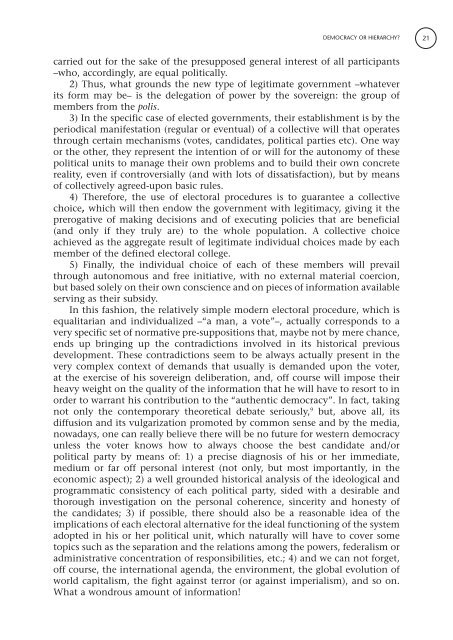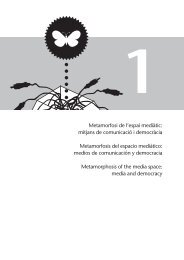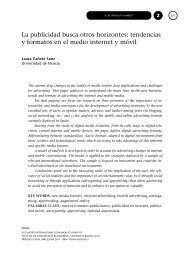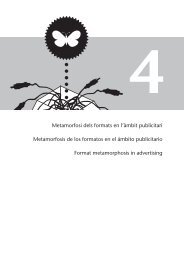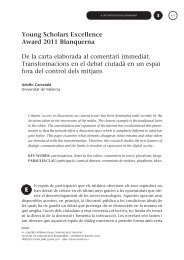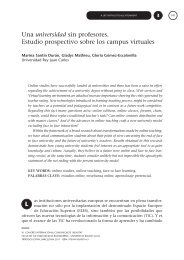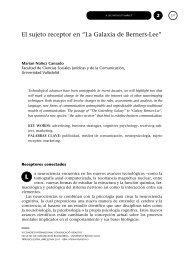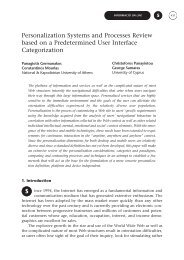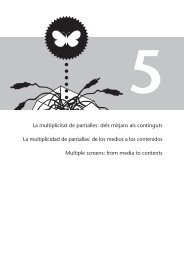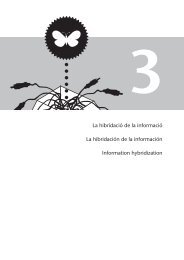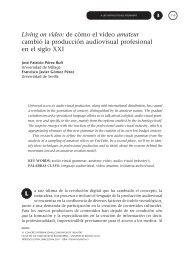- Page 2 and 3: Trípodos [ EXTRA 2009 ] Vol. 1 La
- Page 4 and 5: Alfons Medina, Josep Rom, Francesc
- Page 6 and 7: Sumari | Sumario | Contents Present
- Page 8 and 9: Cyberbullying: un análisis compara
- Page 10 and 11: Jordi Xifra (Departamento de Comuni
- Page 12 and 13: ¿Un futuro open source? Una primer
- Page 14: Presentació Actualment, assistim a
- Page 18 and 19: Democracy or Hierarchy? Democratic
- Page 20 and 21: DEMOCRACY OR HIERARCHY? 19 No matte
- Page 24 and 25: DEMOCRACY OR HIERARCHY? 23 All thes
- Page 26 and 27: DEMOCRACY OR HIERARCHY? 25 particip
- Page 28 and 29: DEMOCRACY OR HIERARCHY? 27 stronger
- Page 30 and 31: DEMOCRACY OR HIERARCHY? 29 (“clie
- Page 32 and 33: DEMOCRACY OR HIERARCHY? 31 performa
- Page 34 and 35: DEMOCRACY OR HIERARCHY? 33 What doe
- Page 36 and 37: etween the adoption of a rigorously
- Page 38: FGV/Espaço e Tempo, 1999. 35. And
- Page 41 and 42: 40 L.R. ROMERO, A. LABIO, A. PINEDA
- Page 43 and 44: 42 L.R. ROMERO, A. LABIO, A. PINEDA
- Page 45 and 46: 44 L.R. ROMERO, A. LABIO, A. PINEDA
- Page 47 and 48: 46 L.R. ROMERO, A. LABIO, A. PINEDA
- Page 49 and 50: 48 MANUEL PARÉS I MAICAS V CONGRÉ
- Page 51 and 52: 50 MANUEL PARÉS I MAICAS V CONGRÉ
- Page 53 and 54: 52 MANUEL PARÉS I MAICAS Crisi de
- Page 56 and 57: METAMORFOSI DE L’ESPAI MEDIÀTIC:
- Page 58 and 59: LAS CLAVES DE SENTIDO SOBRE LA COMU
- Page 60 and 61: LAS CLAVES DE SENTIDO SOBRE LA COMU
- Page 62 and 63: LAS CLAVES DE SENTIDO SOBRE LA COMU
- Page 64 and 65: LAS CLAVES DE SENTIDO SOBRE LA COMU
- Page 66: miento social del diario El País,
- Page 69 and 70: 68 SUE ARAN RAMSPOTT, MIQUEL RODRIG
- Page 71 and 72: 70 SUE ARAN RAMSPOTT, MIQUEL RODRIG
- Page 73 and 74:
72 SUE ARAN RAMSPOTT, MIQUEL RODRIG
- Page 75 and 76:
74 SUE ARAN RAMSPOTT, MIQUEL RODRIG
- Page 78 and 79:
Las ediciones territoriales como es
- Page 80 and 81:
LAS EDICIONES TERRITORIALES COMO ES
- Page 82 and 83:
LAS EDICIONES TERRITORIALES COMO ES
- Page 84 and 85:
Conclusiones LAS EDICIONES TERRITOR
- Page 86 and 87:
Redes para la recuperación de la m
- Page 88 and 89:
REDES PARA LA RECUPERACIÓN DE LA M
- Page 90 and 91:
REDES PARA LA RECUPERACIÓN DE LA M
- Page 92 and 93:
REDES PARA LA RECUPERACIÓN DE LA M
- Page 94:
todoslosnombres.org> Valdenoceda, P
- Page 97 and 98:
96 MERITXELL ESQUIROL SALOM V CONGR
- Page 99 and 100:
98 MERITXELL ESQUIROL SALOM V CONGR
- Page 101 and 102:
100 MERITXELL ESQUIROL SALOM V CONG
- Page 103 and 104:
102 MERITXELL ESQUIROL SALOM Repens
- Page 106 and 107:
Radios libres e internet: la voz de
- Page 108 and 109:
RADIOS LIBRES E INTERNET: LA VOZ DE
- Page 110 and 111:
RADIOS LIBRES E INTERNET: LA VOZ DE
- Page 112:
libres de la CAV con el Gobierno Va
- Page 115 and 116:
114 RED DE INVESTIGACIÓN INVIOTEL
- Page 117 and 118:
116 RED DE INVESTIGACIÓN INVIOTEL
- Page 119 and 120:
118 RED DE INVESTIGACIÓN INVIOTEL
- Page 121 and 122:
120 RED DE INVESTIGACIÓN INVIOTEL
- Page 123 and 124:
122 RED DE INVESTIGACIÓN INVIOTEL
- Page 125 and 126:
124 RED DE INVESTIGACIÓN INVIOTEL
- Page 127 and 128:
126 ANA MARÍA MEDINA HEREDIA V CON
- Page 129 and 130:
128 ANA MARÍA MEDINA HEREDIA V CON
- Page 131 and 132:
130 ANA MARÍA MEDINA HEREDIA V CON
- Page 133 and 134:
132 ANA MARÍA MEDINA HEREDIA V CON
- Page 135 and 136:
134 TONI AIRA V CONGRÉS INTERNACIO
- Page 137 and 138:
136 TONI AIRA V CONGRÉS INTERNACIO
- Page 139 and 140:
138 TONI AIRA V CONGRÉS INTERNACIO
- Page 142 and 143:
Espacio público democrático y ló
- Page 144 and 145:
La construcción de la memoria ESPA
- Page 146 and 147:
Enunciación performativa ESPACIO P
- Page 148 and 149:
ESPACIO PÚBLICO DEMOCRÁTICO Y LÓ
- Page 150 and 151:
ESPACIO PÚBLICO DEMOCRÁTICO Y LÓ
- Page 152 and 153:
Comunicación de riesgo y participa
- Page 154 and 155:
COMUNICACIÓN DE RIESGO Y PARTICIPA
- Page 156 and 157:
COMUNICACIÓN DE RIESGO Y PARTICIPA
- Page 158 and 159:
COMUNICACIÓN DE RIESGO Y PARTICIPA
- Page 160:
IRGC, 2005. KASPERSON, R. “Six pr
- Page 163 and 164:
162 SONIA BALLANO MACÍAS V CONGRÉ
- Page 165 and 166:
164 SONIA BALLANO MACÍAS V CONGRÉ
- Page 167 and 168:
166 SONIA BALLANO MACÍAS V CONGRÉ
- Page 169 and 170:
168 SONIA BALLANO MACÍAS reflexiva
- Page 172 and 173:
¿Qué dicen los observadores (vigi
- Page 174 and 175:
¿QUÉ DICEN LOS OBSERVADORES (VIGI
- Page 176 and 177:
¿QUÉ DICEN LOS OBSERVADORES (VIGI
- Page 178 and 179:
¿QUÉ DICEN LOS OBSERVADORES (VIGI
- Page 180 and 181:
¿QUÉ DICEN LOS OBSERVADORES (VIGI
- Page 182:
%20mujeres%20y%20su%20tratamiento%2
- Page 185 and 186:
184 JOSEP M. SANMARTÍ ROSET, RAÚL
- Page 187 and 188:
186 JOSEP M. SANMARTÍ ROSET, RAÚL
- Page 189 and 190:
188 JOSEP M. SANMARTÍ ROSET, RAÚL
- Page 191 and 192:
190 JOSEP M. SANMARTÍ ROSET, RAÚL
- Page 194 and 195:
METAMORFOSI DE L’ESPAI MEDIÀTIC:
- Page 196 and 197:
LIBERTAD DE EXPRESIÓN Y DERECHO A
- Page 198 and 199:
LIBERTAD DE EXPRESIÓN Y DERECHO A
- Page 200 and 201:
LIBERTAD DE EXPRESIÓN Y DERECHO A
- Page 202 and 203:
LIBERTAD DE EXPRESIÓN Y DERECHO A
- Page 204 and 205:
LIBERTAD DE EXPRESIÓN Y DERECHO A
- Page 206 and 207:
Nuevos públicos en una sociedad en
- Page 208 and 209:
NUEVOS PÚBLICOS EN UNA SOCIEDAD EN
- Page 210 and 211:
NUEVOS PÚBLICOS EN UNA SOCIEDAD EN
- Page 212 and 213:
NUEVOS PÚBLICOS EN UNA SOCIEDAD EN
- Page 214 and 215:
NUEVOS PÚBLICOS EN UNA SOCIEDAD EN
- Page 216 and 217:
Espacios de solidaridad en internet
- Page 218 and 219:
ESPACIOS DE SOLIDARIDAD EN INTERNET
- Page 220 and 221:
ESPACIOS DE SOLIDARIDAD EN INTERNET
- Page 222 and 223:
ESPACIOS DE SOLIDARIDAD EN INTERNET
- Page 224 and 225:
ESPACIOS DE SOLIDARIDAD EN INTERNET
- Page 226 and 227:
ESPACIOS DE SOLIDARIDAD EN INTERNET
- Page 228 and 229:
objeto de estudio los medios étnic
- Page 230 and 231:
Internet celebrities: fama, estrell
- Page 232 and 233:
INTERNET CELEBRITIES: FAMA, ESTRELL
- Page 234 and 235:
INTERNET CELEBRITIES: FAMA, ESTRELL
- Page 236 and 237:
INTERNET CELEBRITIES: FAMA, ESTRELL
- Page 238 and 239:
a Cultural Theory of YouTube”. [E
- Page 240 and 241:
De la persuasió de l’opinió pú
- Page 242 and 243:
DE LA PERSUASIÓ DE L’OPINIÓ PÚ
- Page 244 and 245:
DE LA PERSUASIÓ DE L’OPINIÓ PÚ
- Page 246 and 247:
DE LA PERSUASIÓ DE L’OPINIÓ PÚ
- Page 248 and 249:
METAMORFOSI DE L’ESPAI MEDIÀTIC:
- Page 250 and 251:
¿QUIÉN DEBERÍA VELAR POR EL ESPA
- Page 252 and 253:
¿QUIÉN DEBERÍA VELAR POR EL ESPA
- Page 254 and 255:
¿QUIÉN DEBERÍA VELAR POR EL ESPA
- Page 256 and 257:
¿QUIÉN DEBERÍA VELAR POR EL ESPA
- Page 258 and 259:
Construcción de ciudadanía desde
- Page 260 and 261:
CONSTRUCCIÓN DE CIUDADANÍA DESDE
- Page 262 and 263:
CONSTRUCCIÓN DE CIUDADANÍA DESDE
- Page 264 and 265:
CONSTRUCCIÓN DE CIUDADANÍA DESDE
- Page 266:
CONSTRUCCIÓN DE CIUDADANÍA DESDE
- Page 269 and 270:
268 ENRIC CASTELLÓ, MARTA MONTAGUT
- Page 271 and 272:
270 ENRIC CASTELLÓ, MARTA MONTAGUT
- Page 273 and 274:
272 ENRIC CASTELLÓ, MARTA MONTAGUT
- Page 275 and 276:
274 ENRIC CASTELLÓ, MARTA MONTAGUT
- Page 278:
2 Generació digital: oportunitats
- Page 281 and 282:
280 J. SÁNCHEZ I TORRENTS V CONGR
- Page 283 and 284:
282 J. SÁNCHEZ I TORRENTS V CONGR
- Page 285 and 286:
284 J. SÁNCHEZ I TORRENTS V CONGR
- Page 287 and 288:
286 J. SÁNCHEZ I TORRENTS Bibliogr
- Page 289 and 290:
288 JOSÉ LUIS REQUEJO, SUSANA HERR
- Page 291 and 292:
290 JOSÉ LUIS REQUEJO, SUSANA HERR
- Page 293 and 294:
292 JOSÉ LUIS REQUEJO, SUSANA HERR
- Page 295 and 296:
294 JOSÉ LUIS REQUEJO, SUSANA HERR
- Page 298 and 299:
GENERACIÓ DIGITAL: OPORTUNITATS I
- Page 300 and 301:
VIOLENCIA EN EL CIBERESPACIO: NUEVA
- Page 302 and 303:
VIOLENCIA EN EL CIBERESPACIO: NUEVA
- Page 304 and 305:
Conclusiones VIOLENCIA EN EL CIBERE
- Page 306:
innatas de las mujeres y cómo est
- Page 309 and 310:
308 J. DEL RÍO, X. BRINGUE, CH. S
- Page 311 and 312:
310 J. DEL RÍO, X. BRINGUE, CH. S
- Page 313 and 314:
312 J. DEL RÍO, X. BRINGUE, CH. S
- Page 315 and 316:
314 J. DEL RÍO, X. BRINGUE, CH. S
- Page 317 and 318:
316 J. DEL RÍO, X. BRINGUE, CH. S
- Page 319 and 320:
318 WANNES HEIRMAN, MICHEL WALRAVE
- Page 321 and 322:
320 WANNES HEIRMAN, MICHEL WALRAVE
- Page 323 and 324:
322 WANNES HEIRMAN, MICHEL WALRAVE
- Page 325 and 326:
324 WANNES HEIRMAN, MICHEL WALRAVE
- Page 327 and 328:
326 WANNES HEIRMAN, MICHEL WALRAVE
- Page 329 and 330:
328 WANNES HEIRMAN, MICHEL WALRAVE
- Page 332 and 333:
GENERACIÓ DIGITAL: OPORTUNITATS I
- Page 334 and 335:
USOS Y CONSUMOS DE LAS REDES SOCIAL
- Page 336 and 337:
USOS Y CONSUMOS DE LAS REDES SOCIAL
- Page 338 and 339:
USOS Y CONSUMOS DE LAS REDES SOCIAL
- Page 340 and 341:
Semiotic approach of media metamorp
- Page 342 and 343:
SEMIOTIC APPROACH OF MEDIA METAMORP
- Page 344 and 345:
SEMIOTIC APPROACH OF MEDIA METAMORP
- Page 346 and 347:
SEMIOTIC APPROACH OF MEDIA METAMORP
- Page 348:
SEMIOTIC APPROACH OF MEDIA METAMORP
- Page 351 and 352:
350 M.D. CÁCERES, J.A. RUIZ, P. N
- Page 353 and 354:
352 M.D. CÁCERES, J.A. RUIZ, P. N
- Page 355 and 356:
354 M.D. CÁCERES, J.A. RUIZ, P. N
- Page 357 and 358:
356 M.D. CÁCERES, J.A. RUIZ, P. N
- Page 360 and 361:
GENERACIÓ DIGITAL: OPORTUNITATS I
- Page 362 and 363:
AN INQUIRY INTO THE LEGAL AUTHORITY
- Page 364 and 365:
AN INQUIRY INTO THE LEGAL AUTHORITY
- Page 366 and 367:
AN INQUIRY INTO THE LEGAL AUTHORITY
- Page 368 and 369:
AN INQUIRY INTO THE LEGAL AUTHORITY
- Page 370 and 371:
GENERACIÓ DIGITAL: OPORTUNITATS I
- Page 372 and 373:
REPRESENTACIÓN MEDIÁTICA DE LAS R
- Page 374 and 375:
REPRESENTACIÓN MEDIÁTICA DE LAS R
- Page 376 and 377:
BERGANZA, R.; DEL HOYO, M. “La mu
- Page 378 and 379:
GENERACIÓ DIGITAL: OPORTUNITATS I
- Page 380 and 381:
SOCIALIZACIÓN E IDENTIDAD A TRAVÉ
- Page 382 and 383:
SOCIALIZACIÓN E IDENTIDAD A TRAVÉ
- Page 384 and 385:
SOCIALIZACIÓN E IDENTIDAD A TRAVÉ
- Page 386:
PIÑUEL, J.L.; LOZANO, C. Ensayo ge
- Page 389 and 390:
388 M.C. GARCÍA, J. ALONSO, R. BER
- Page 391 and 392:
390 M.C. GARCÍA, J. ALONSO, R. BER
- Page 393 and 394:
392 M.C. GARCÍA, J. ALONSO, R. BER
- Page 395 and 396:
394 M.C. GARCÍA, J. ALONSO, R. BER
- Page 397 and 398:
396 J. SÁNCHEZ-NAVARRO, D. ARANDA,
- Page 399 and 400:
398 J. SÁNCHEZ-NAVARRO, D. ARANDA,
- Page 401 and 402:
400 J. SÁNCHEZ-NAVARRO, D. ARANDA,
- Page 403 and 404:
402 J. SÁNCHEZ-NAVARRO, D. ARANDA,
- Page 405 and 406:
404 J. SÁNCHEZ-NAVARRO, D. ARANDA,
- Page 408 and 409:
GENERACIÓ DIGITAL: OPORTUNITATS I
- Page 410 and 411:
EXPERIENCIA FAN EN LA CULTURA DIGIT
- Page 412 and 413:
EXPERIENCIA FAN EN LA CULTURA DIGIT
- Page 414 and 415:
Extra 2005. III Congrés Internacio
- Page 416 and 417:
GENERACIÓ DIGITAL: OPORTUNITATS I
- Page 418 and 419:
PRINCESES, ÀNGELS, DIMONIS I PARAD
- Page 420 and 421:
PRINCESES, ÀNGELS, DIMONIS I PARAD
- Page 422 and 423:
PRINCESES, ÀNGELS, DIMONIS I PARAD
- Page 424:
3 La hibridació de la informació
- Page 427 and 428:
426 X. SOENGAS, A.I. RODRÍGUEZ, A.
- Page 429 and 430:
428 X. SOENGAS, A.I. RODRÍGUEZ, A.
- Page 431 and 432:
430 X. SOENGAS, A.I. RODRÍGUEZ, A.
- Page 433 and 434:
432 X. SOENGAS, A.I. RODRÍGUEZ, A.
- Page 435 and 436:
434 X. SOENGAS, A.I. RODRÍGUEZ, A.
- Page 437 and 438:
436 KOLDOBIKA MESO AYERDI, MARÍA B
- Page 439 and 440:
438 KOLDOBIKA MESO AYERDI, MARÍA B
- Page 441 and 442:
440 KOLDOBIKA MESO AYERDI, MARÍA B
- Page 443 and 444:
442 KOLDOBIKA MESO AYERDI, MARÍA B
- Page 445 and 446:
444 KOLDOBIKA MESO AYERDI, MARÍA B
- Page 448 and 449:
La digitalització dels mèdia. Nov
- Page 450 and 451:
LA DIGITALITZACIÓ DELS MÈDIA. NOV
- Page 452 and 453:
LA DIGITALITZACIÓ DELS MÈDIA. NOV
- Page 454 and 455:
LA DIGITALITZACIÓ DELS MÈDIA. NOV
- Page 456:
LA DIGITALITZACIÓ DELS MÈDIA. NOV
- Page 459 and 460:
458 CARLOS MUÑIZ, JACOBO RAMÍREZ,
- Page 461 and 462:
460 CARLOS MUÑIZ, JACOBO RAMÍREZ,
- Page 463 and 464:
462 CARLOS MUÑIZ, JACOBO RAMÍREZ,
- Page 465 and 466:
464 CARLOS MUÑIZ, JACOBO RAMÍREZ,
- Page 467 and 468:
466 CARLOS MUÑIZ, JACOBO RAMÍREZ,
- Page 469 and 470:
468 BELÉN MONCLÚS, MIGUEL VICENTE
- Page 471 and 472:
470 BELÉN MONCLÚS, MIGUEL VICENTE
- Page 473 and 474:
472 BELÉN MONCLÚS, MIGUEL VICENTE
- Page 475 and 476:
474 BELÉN MONCLÚS, MIGUEL VICENTE
- Page 477 and 478:
476 BELÉN MONCLÚS, MIGUEL VICENTE
- Page 479 and 480:
478 BELÉN MONCLÚS, MIGUEL VICENTE
- Page 481 and 482:
480 BELÉN MONCLÚS, MIGUEL VICENTE
- Page 483 and 484:
482 EVA PATRICIA FERNÁNDEZ V CONGR
- Page 485 and 486:
484 EVA PATRICIA FERNÁNDEZ V CONGR
- Page 487 and 488:
486 EVA PATRICIA FERNÁNDEZ V CONGR
- Page 489 and 490:
488 EVA PATRICIA FERNÁNDEZ V CONGR
- Page 491 and 492:
490 ELENA YESTE, FRANCESC CANOSA V
- Page 493 and 494:
492 ELENA YESTE, FRANCESC CANOSA V
- Page 495 and 496:
494 ELENA YESTE, FRANCESC CANOSA V
- Page 497 and 498:
496 ELENA YESTE, FRANCESC CANOSA ma
- Page 499 and 500:
498 A. GARCÍA, R. VINADER, R. GALI
- Page 501 and 502:
500 A. GARCÍA, R. VINADER, R. GALI
- Page 503 and 504:
502 A. GARCÍA, R. VINADER, R. GALI
- Page 505 and 506:
504 A. GARCÍA, R. VINADER, R. GALI
- Page 508 and 509:
LA HIBRIDACIÓ DE LA INFORMACIÓ El
- Page 510 and 511:
EL PAPEL DE LOS LECTORES EN LA CRIS
- Page 512 and 513:
EL PAPEL DE LOS LECTORES EN LA CRIS
- Page 514 and 515:
Tabla 2. Variables seleccionadas y
- Page 516:
Annual de la INMA. “Managing Perc
- Page 519 and 520:
518 F. CANOSA, A. MEDINA, L. GILBER
- Page 521 and 522:
520 F. CANOSA, A. MEDINA, L. GILBER
- Page 523 and 524:
522 F. CANOSA, A. MEDINA, L. GILBER
- Page 525 and 526:
524 F. CANOSA, A. MEDINA, L. GILBER
- Page 527 and 528:
526 F. CANOSA, A. MEDINA, L. GILBER
- Page 529 and 530:
528 ANDREU CASERO RIPOLLÉS V CONGR
- Page 531 and 532:
530 ANDREU CASERO RIPOLLÉS V CONGR
- Page 533 and 534:
532 ANDREU CASERO RIPOLLÉS V CONGR
- Page 535 and 536:
534 ANDREU CASERO RIPOLLÉS Conclus
- Page 538 and 539:
El lector como creador de contenido
- Page 540 and 541:
EL LECTOR COMO CREADOR DE CONTENIDO
- Page 542 and 543:
EL LECTOR COMO CREADOR DE CONTENIDO
- Page 544 and 545:
EL LECTOR COMO CREADOR DE CONTENIDO
- Page 546 and 547:
Los estatutos de redacción como el
- Page 548 and 549:
LOS ESTATUTOS DE REDACCIÓN COMO EL
- Page 550 and 551:
LOS ESTATUTOS DE REDACCIÓN COMO EL
- Page 552 and 553:
LOS ESTATUTOS DE REDACCIÓN COMO EL
- Page 554:
LOS ESTATUTOS DE REDACCIÓN COMO EL
- Page 557 and 558:
556 ALEXANDR PETRÓVICH, EMILIA VLA
- Page 559 and 560:
558 ALEXANDR PETRÓVICH, EMILIA VLA
- Page 561 and 562:
560 ALEXANDR PETRÓVICH, EMILIA VLA
- Page 563 and 564:
562 PERE MASIP, JOSEP LLUÍS MICÓ,
- Page 565 and 566:
564 PERE MASIP, JOSEP LLUÍS MICÓ,
- Page 567 and 568:
566 PERE MASIP, JOSEP LLUÍS MICÓ,
- Page 569 and 570:
568 PERE MASIP, JOSEP LLUÍS MICÓ,
- Page 571 and 572:
570 PERE MASIP, JOSEP LLUÍS MICÓ,
- Page 573 and 574:
572 PERE MASIP, JOSEP LLUÍS MICÓ,
- Page 576 and 577:
Los medios de comunicacion en Galic
- Page 578 and 579:
LOS MEDIOS DE COMUNICACION EN GALIC
- Page 580 and 581:
Contenido LOS MEDIOS DE COMUNICACIO
- Page 582 and 583:
Frecuencia de actualización LOS ME
- Page 584 and 585:
LOS MEDIOS DE COMUNICACION EN GALIC
- Page 586 and 587:
Las preferencias de los usuarios co
- Page 588 and 589:
Metodología LAS PREFERENCIAS DE LO
- Page 590 and 591:
Resultados LAS PREFERENCIAS DE LOS
- Page 592 and 593:
LAS PREFERENCIAS DE LOS USUARIOS CO
- Page 594 and 595:
LAS PREFERENCIAS DE LOS USUARIOS CO
- Page 596 and 597:
LA HIBRIDACIÓ DE LA INFORMACIÓ In
- Page 598 and 599:
INSTRUMENTOS DE MEDIDA DE UN FACTOR
- Page 600 and 601:
INSTRUMENTOS DE MEDIDA DE UN FACTOR
- Page 602 and 603:
INSTRUMENTOS DE MEDIDA DE UN FACTOR
- Page 604:
INSTRUMENTOS DE MEDIDA DE UN FACTOR
- Page 607 and 608:
606 L. PASTOR, J. XIFRA, A. CLÚA V
- Page 609 and 610:
608 L. PASTOR, J. XIFRA, A. CLÚA V
- Page 611 and 612:
610 L. PASTOR, J. XIFRA, A. CLÚA V
- Page 613 and 614:
612 L. PASTOR, J. XIFRA, A. CLÚA V
- Page 615 and 616:
614 L. PASTOR, J. XIFRA, A. CLÚA 2
- Page 617 and 618:
616 SONIA GONZÁLEZ, JOSEP LLUÍS M
- Page 619 and 620:
618 SONIA GONZÁLEZ, JOSEP LLUÍS M
- Page 621 and 622:
620 SONIA GONZÁLEZ, JOSEP LLUÍS M
- Page 623 and 624:
622 SONIA GONZÁLEZ, JOSEP LLUÍS M
- Page 626 and 627:
Inventing new journalistic formats?
- Page 628 and 629:
INVENTING NEW JOURNALISTIC FORMATS?
- Page 630 and 631:
INVENTING NEW JOURNALISTIC FORMATS?
- Page 632 and 633:
INVENTING NEW JOURNALISTIC FORMATS?
- Page 634 and 635:
INVENTING NEW JOURNALISTIC FORMATS?
- Page 636 and 637:
INVENTING NEW JOURNALISTIC FORMATS?
- Page 638 and 639:
LA HIBRIDACIÓ DE LA INFORMACIÓ La
- Page 640 and 641:
LA PARTICIPACIÓN EN LOS DIARIOS DI
- Page 642 and 643:
LA PARTICIPACIÓN EN LOS DIARIOS DI
- Page 644 and 645:
LA PARTICIPACIÓN EN LOS DIARIOS DI
- Page 646:
LA PARTICIPACIÓN EN LOS DIARIOS DI
- Page 649 and 650:
648 DÍAZ, CODINA, DA FONSECA, LÓP
- Page 651 and 652:
650 DÍAZ, CODINA, DA FONSECA, LÓP
- Page 653 and 654:
652 DÍAZ, CODINA, DA FONSECA, LÓP
- Page 655 and 656:
654 DÍAZ, CODINA, DA FONSECA, LÓP
- Page 657 and 658:
656 DÍAZ, CODINA, DA FONSECA, LÓP
- Page 659 and 660:
658 JOAN FRANCESC FONDEVILA I GASC
- Page 661 and 662:
660 JOAN FRANCESC FONDEVILA I GASC
- Page 663 and 664:
662 JOAN FRANCESC FONDEVILA I GASC
- Page 665 and 666:
664 JOAN FRANCESC FONDEVILA I GASC
- Page 667 and 668:
666 JOAN FRANCESC FONDEVILA I GASC
- Page 669 and 670:
668 DOLORS PALAU SAMPIO V CONGRÉS
- Page 671 and 672:
670 DOLORS PALAU SAMPIO V CONGRÉS
- Page 673 and 674:
672 DOLORS PALAU SAMPIO V CONGRÉS
- Page 675 and 676:
674 DOLORS PALAU SAMPIO V CONGRÉS


